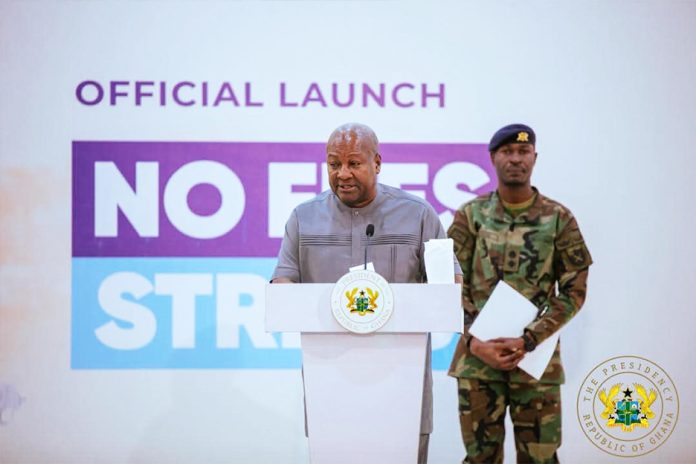President John Dramani Mahama has launched a transformative policy dubbed the ‘No Fees Stress’ initiative, aimed at removing financial constraints that prevent thousands of Ghanaian students from accessing tertiary education.
The policy was officially introduced on Friday at the SDA College of Education in Koforidua. It seeks to ease the cost burden on students particularly those from disadvantaged and underrepresented backgrounds while encouraging enrolment in fields critical to national development.
In his address, President Mahama outlined the major features of the initiative, which key among them is the full absorption of academic-related fees for all first-year students entering public tertiary institutions.
This includes universities, technical universities, colleges of education, and nursing training institutions.
He further announced that the existing student loan scheme has been restructured to offer greater support for continuing students whilst eligibility criteria have also been broadened and access to loans simplified, with the allocation to the Student Loan Trust Fund set to double in the coming year to meet rising demand.
Additionally, loan amounts will be increased to reflect the true cost of tertiary education, with annual adjustments tied to inflation.
As part of the policy, and in accordance with Ghana’s Disability Act, President Mahama declared that all students with disabilities will receive free tertiary education from admission through graduation.
Students enrolled in fee-paying programmes that have no regular track alternatives will also receive up to GHS 2,500 in government reimbursements for academic-related costs.
President Mahama emphasised that the policy is designed to close the growing access gap at the tertiary level, where he cited data from the Ghana Tertiary Education Commission (GTEC), showing that while over 150,000 students were admitted to public tertiary institutions in the 2022/2023 academic year, thousands failed to enrol due to financial challenges.
“The tragedy is that these fees are demanded even before students have the chance to register for student loans,” he remarked.
He acknowledged that while significant progress has been made through the Free Compulsory Universal Basic Education (FCUBE) and the Free Senior High School (SHS) programme, families are often hit with steep expenses once their children reach the tertiary level.
A Constitutional and Developmental Imperative
Describing the ‘No Fees Stress’ initiative as more than just a fiscal policy, President Mahama called it a moral, constitutional, and national development duty, referencing World Bank research indicating that each additional year of tertiary education can increase an individual’s earning potential by up to 17% in developing countries.
Despite this, Ghana’s 2021 Population and Housing Census revealed that only 18% of adults aged 18 and above have completed tertiary education, an alarming statistic that threatens the country’s ability to transition to a knowledge-based economy.
President Mahama urged education stakeholders to rally behind the policy, stressing that education remains the most powerful tool for reducing inequality and lifting people out of poverty.
“This policy lifts the greatest burden, the cost of entry that has locked too many bright and capable young people out of higher education,” he said.









